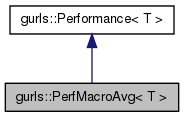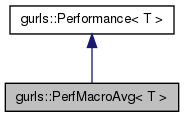 |
GURLS++
2.0.00
C++ Implementation of GURLS Matlab Toolbox
|
 |
GURLS++
2.0.00
C++ Implementation of GURLS Matlab Toolbox
|
PerfMacroAvg is the sub-class of Performance that evaluates prediction accuracy.
#include <macroavg.h>


Public Member Functions | |
| GurlsOptionsList * | execute (const gMat2D< T > &X, const gMat2D< T > &Y, const GurlsOptionsList &opt) throw (gException) |
| Evaluates the average accuracy per class. | |
Static Public Member Functions | |
| static Performance< T > * | factory (const std::string &id) throw (BadPerformanceCreation) |
| Factory function returning a pointer to the newly created object. | |
Protected Member Functions | |
| void | macroavg (const unsigned long *trueY, const unsigned long *predY, const int length, int totClasses, T *&perClass, T ¯oAverage, unsigned long &perClass_length) |
| Auxiliary function called by execute method. | |
Definition at line 62 of file macroavg.h.
| GurlsOptionsList * gurls::PerfMacroAvg< T >::execute | ( | const gMat2D< T > & | X, |
| const gMat2D< T > & | Y, | ||
| const GurlsOptionsList & | opt | ||
| ) | throw (gException) [virtual] |
| X | input data matrix |
| Y | labels matrix |
| opt | options with the following:
|
Implements gurls::Performance< T >.
Definition at line 84 of file macroavg.h.
{
const unsigned long rows = Y.rows();
const unsigned long cols = Y.cols();
// if isfield (opt,'perf')
// p = opt.perf; % lets not overwrite existing performance measures.
// % unless they have the same name
// end
GurlsOptionsList* perf = NULL;
if(opt.hasOpt("perf"))
{
GurlsOptionsList* tmp_opt = new GurlsOptionsList("tmp");
tmp_opt->copyOpt("perf", opt);
perf = GurlsOptionsList::dynacast(tmp_opt->getOpt("perf"));
tmp_opt->removeOpt("perf", false);
delete tmp_opt;
perf->removeOpt("acc");
perf->removeOpt("forho");
// perf->removeOpt("forplot");
}
else
perf = new GurlsOptionsList("perf");
gMat2D<T>* acc_mat = new gMat2D<T>(1, cols);
T* acc = acc_mat->getData();
// T = size(y,2);
// y_true = y;
const T* y_true = Y.getData();
// y_pred = opt.pred;
const gMat2D<T> &y_pred = opt.getOptValue<OptMatrix<gMat2D<T> > >("pred");
// if size(y,2) == 1
if(cols == 1)
{
// predlab = sign(y_pred);
T* predLab = sign(y_pred.getData(), y_pred.getSize());
T* tmp = compare<T>(predLab, Y.getData(), rows, &eq);
// p.acc = mean(predlab == y);
mean(tmp, acc, rows, 1, 1);
// p.forho = mean(predlab == y);
// p.forplot = mean(predlab == y);
delete [] tmp;
delete [] predLab;
}
else
{
// %% Assumes single label prediction.
// [dummy, predlab] = max(y_pred,[],2);
T* work = new T[std::max(Y.getSize(), y_pred.getSize() )];
unsigned long* predLab = new unsigned long[rows];
indicesOfMax(y_pred.getData(), rows, y_pred.cols(), predLab, work, 2);
// [dummy, truelab] = max(y_true,[],2);
// unsigned long* trueLab = indicesOfMax(y_true, rows, cols, 2);
unsigned long* trueLab = new unsigned long[rows];
indicesOfMax(y_true, rows, cols, trueLab, work, 2);
delete[] work;
// [MacroAvg, PerClass] = macroavg(truelab, predlab);
T macroAverage;
T* perClass;
unsigned long perClass_length;
macroavg(trueLab, predLab, rows, cols, perClass, macroAverage, perClass_length);
if(perClass_length > cols)
throw gException(Exception_Inconsistent_Size);
delete[] predLab;
delete[] trueLab;
// for t = 1:length(PerClass),
// p.acc(t) = PerClass(t);
// p.forho(t) = p.acc(t);
// p.forplot(t) = p.acc(t);
// end
// for t = (length(PerClass)+1):T
// p.acc(t) = 0;
// p.forho(t) = 0;
// p.forplot(t) = 0;
// end
copy(acc, perClass, perClass_length);
if(perClass_length < cols)
set(acc+perClass_length, (T)0.0, cols-perClass_length);
delete[] perClass;
}
OptMatrix<gMat2D<T> >* acc_opt = new OptMatrix<gMat2D<T> >(*acc_mat);
perf->addOpt("acc", acc_opt);
OptMatrix<gMat2D<T> >* forho_opt = new OptMatrix<gMat2D<T> >(*(new gMat2D<T>(*acc_mat)));
perf->addOpt("forho", forho_opt);
// OptMatrix<gMat2D<T> >* forplot_opt = new OptMatrix<gMat2D<T> >(*(new gMat2D<T>(*acc_mat)));
// perf->addOpt("forplot", forplot_opt);
return perf;
}
| static Performance<T>* gurls::Performance< T >::factory | ( | const std::string & | id | ) | throw (BadPerformanceCreation) [inline, static, inherited] |
Definition at line 111 of file perf.h.
{
if(id == "precrec")
return new PerfPrecRec<T>;
if(id == "macroavg")
return new PerfMacroAvg<T>;
if(id == "rmse")
return new PerfRmse<T>;
throw BadPerformanceCreation(id);
}